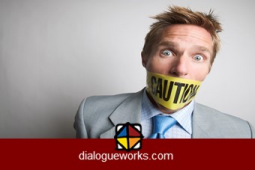Does Your Nonverbal Behavior Box You In? 12 Tips for Improving Your Body Language

I had just finished speaking at an event and a number of people came up to the stage to talk and to ask questions that they didn’t want to ask in front of the entire group. After a few moments I was approached by a woman who began rapidly asking me a number of questions. Before I could finish answering one question, she would hit me with another question.
Can You Debunk the "93/7" Rule?

Q: I was reading some content on your website and noticed that you mentioned that words make up only about 7% of a conversation. I hope you aren’t devaluing the value of language or words. Are you aware of the “Mehrabian Myth,” an attempt to show how badly Mehrabian’s research was misinterpreted?
A: Mehrabian’s research established two distinct points. First, people form their perceptions of others in a conversation in three distinct ways: visually--55% (non-verbal behavior); vocally--38% (voice tone); and verbally--7% (word usage) which resulted in...
Do Leaders Sabotage Accountability?

Q: I have recently attended a number of webinars and a workshop on accountability. Some of the training touched on the importance of holding clear and concise “accountability conversations” to ensure commitment and follow-through to achieve results. I understand how important it would be in holding these types of conversations, but I wondered if there are behaviors that leaders might engage in which undermine the accountability they are trying to instill in others. Can leaders sabotage their efforts to increase the accountability of those who work for them?
A: Authentic leadership requires both talk and walk. A leader who is unaware...
Emotional Intelligence Begins with Self-awareness

A huge factor in improving your emotional intelligence is your personal awareness and understanding of how your behavior impacts others.
How Well Do You Do Empathy? The Secret to Understanding and Connecting with Others

This summer my son, Matthew, and some of his mountain-biking friends decided to ride their bikes down a fairly steep hill. Matt, on a dare, decided to go first. As he sped down the hill, he hit a small dirt mound that catapulted him 10 feet in the air. He came over the handlebars and landed on his shoulder, severing his clavicle from the growth plate on his right shoulder. When I finally arrived on the scene, I knew something was terribly wrong when we removed his t-shirt and could see his clavicle sticking up under the skin.
Can You Help Others to Understand a Different Perspective? Seven Steps for Increasing Understanding

Being in the business of leadership development, I frequently encounter individuals who believe that they know everything about a topic. This assumption of “I’m right, and you’re wrong,” has such a limiting effect on a person’s ability to learn or even consider other viewpoints that it is well worth our reflection.
Do You Follow the Facts? Three Tips for Strengthening Your Conversations

Recently I was discussing with a friend the importance of facts or evidence in conversation. My friend told me the following story about a wayward son. It seems that his son was staying out all hours of the night and coming in early in the morning. The situation was creating some conflict with my friend’s other teenage children.
Leaders, How Do You Begin Your Conversations? Nine Phrases NOT to Use

I really believe that what begins well ends well. It is important to begin a conversation in such a way that allows the other person to hear and think about your message.
Recently, I sat and observed a senior leader begin his conversation with two directors by stating, “As you are probably already thinking….” One director looked at the other and then at their leader and said courageously,
Have You Learned Your Lessons? 11 Communication Tips for Improving Your Change Initiative

I once worked with a company during a change initiative when a company’s business was not going particularly well. The CEO called a meeting of his upper management to discuss how things weren’t going particularly well. A huge process change was three months behind schedule and already $20 million over budget. He began by opening the meeting with, “I want to know who is responsible for the mess we are in, so we can fix this.”
What Are the Rules of Conversational Engagement? 10 Rules for Improving the Quality of Your Interactions with Others

Not long ago, I was watching the movie, Hunter Killer, starring Gerard Butler. It is the story of a submarine commander who is tasked with rescuing the Russian president who has been taken captive by a rogue minister of defense.
How Easily Do You Take Offense? Seven Strategies for Maintaining Your Cool

Jane was sitting in an online meeting where current deadlines were being discussed among team members. At the close of the meeting, Jane’s manager asked if anyone had any other concerns that needed to be addressed.
Jane broke the team’s silence by stating that the IT group had committed to solve a software problem for one of her clients by July 1st.
How Do You Handle a Naysayer? Eight Tips for Managing Those Who Are Negative

Have you ever worked with or met someone whose regular answer to anything they are asked to do is usually “No!” Or perhaps every time you offer an idea, they say, “Yeah, but....”
Are You Lost in Your Assumptions? Seven Questions for Challenging the Accuracy of Your Thinking

A good friend of mine recently sent me a link to an interesting article. It seems a summer intern was not particularly happy with the strictness of the company’s dress code. This person decided to let the issue go until it was discovered that another company member was allowed to wear cloth shoes and sometimes running shoes.
Are You Wearing the Emperor's New Clothes? Six Questions for Improving Your Results
.png)
We are all familiar with the Hans Christian Anderson story of the emperor who thought that he was arrayed in magnificent attire when in reality he was naked. And yet, no one would tell him what was obvious to everyone.
Are Your People on Board? 6 Questions You Need to Answer if You Want Change to Succeed

In one of the first cultural change projects that I worked on, I was tasked with teaching company members process improvement and critical thinking skills. The organization was committed to involving everyone in improving their processes and making a difference in the way they served customers with increased efficiency.















.png)
